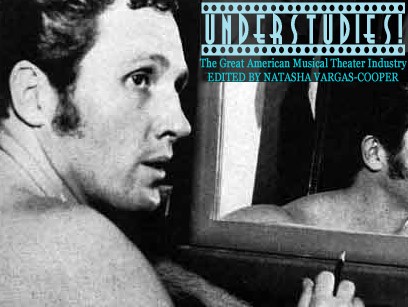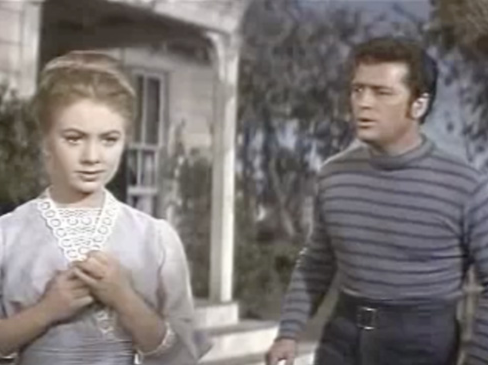Understudies! A Carnival Named Desire: 'Carousel'
by Molly Lambert

Carousel’s main character Billy Bigelow has much in common with Mad Men’s Don Draper besides a fondness for alliteration. He is a cocky, beautiful, ego-driven ball of macho dynamite. The carnival barker thing also makes you realize how much of Bruce Springsteen’s early style came straight off the Jersey piers. Bigelow is the kind of man who can’t help but talk down to everyone, supposedly because he hates himself, but he doesn’t seem to have a lot of regard for most other people either. “Emotion work” is defined as the act of putting on a front that differs from one’s own actual feelings. Traditional masculinity requires nonstop emotional work, monitoring that one does not reveal one’s own actual insecurities and worries, which must get exhausting.
Billy is a grifter, and a charismatic cad, executing the old-timey version of Toot It And Boot It while working as a traveling carny. He is both attracted to the pure young beauty Julie and terrified that he might infect her with his “badness.” He thinks he knows for sure that he’s no good. He is a handsome mooch who doesn’t mind living off Julie’s cousin’s money. His real problem is that he is a coward, and rather than tell Julie that he’s freaked out by being dependent on her he punches her in the face. He even admits to an angel judge in Purgatory (more on that later) that they’d argue and “she’d be right, so I’d hit her.” He is narcissistic and handsome, prone to using women for what they can give him and disappearing when it runs out.
Like opera, musical theater traffics in archetypes. The virginal heroine (soprano) and the slutty comic foil (alto). The sexual stuff is slightly camouflaged, but boy is it there. Billy and Julie meet on the carousel, where he lasciviously watches her ride one of the carved wooden horses. Say what you will about the Twilight franchise, but it has brought back the power of sexual suggestion through aggressive chasteness to film in a way not really seen since they repealed the Hays Code. The couple in Carousel only kiss, but it’s charged with more sexual tension than a month’s worth of True Blood naked scenes.
There is a wide gulf between the sheer bitterness of the story and the flowery Rodgers & Hammerstein songs. Some of the songs are corny, others are beautiful and poignant. The best of the bunch is “If I Loved You,” which hides a really depressing lyric in it about how Julie already knows Billy is going to leave her later on, even though they’ve only just met when she first sings it. The set consisting of some trees and a fake body of water is provocative psychologically for reasons I don’t even really understand.

“June Is Busting Out All Over” is a ridiculous musical number, and the biggest set-piece of the movie, the traditional mid-show attempt to unite the plot lines. There are all kinds of symbolic sexual metaphors about how horny everyone is in springtime set at a clambake. With a wink-a wink that is barely a wink-someone sings “all the rams that chase the new sheep are determined there’ll be new sheep.” There is a direct line from this to Katy Perry’s whipped cream tit-jizzing spectacular “California Gurls.” The film version of Carousel cuts my favorite song from the stage show, “You’re A Queer One, Julie Jordan.”
“Soliloquy” (more commonly known as the song passage with “My Boy Bill” in it) is an iconic story song. Bill fantasizes about his pregnant wife’s spawn being a perfect clone of himself only to realize halfway through that there is a good chance his son will turn out a daughter. She does, of course, and Bill can barely contain his disappointment and terror at being responsible for a woman he can’t really leave and certainly can’t seduce. “You can have fun with a son but you gotta be a father to a girl” he gripes, before turning tender at the thought of caring for such a delicate flower. It doesn’t even occur to him that his daughter might still turn out just like him, which she also of course does (paging Sally Draper).
Impending fatherhood invests Billy with a sudden desire to be responsible, but nobody changes on a dime like that. What would be an unbearably klutzy monologue in a straight drama makes for Gordon MacRae’s, who plays Billy, deftest moments in the film. In this Soliloquy we learn everything about Billy in a way that only musical theater allows for: the way his voice moves from a strong belt to a vulnerable lilt as he works through his thoughts, that we remain fixated for a good five minutes on a man singing about his future child while dancing around on a beach without ever thinking that it seems ridiculous.
Gordon MacRae is good, but the ur-Billy Bigelow is the man who originated the role, John Raitt (father of Bonnie).
The film role was actually originally given to Frank Sinatra, who went so far as to record all the songs before showing up and deciding to leave after being told he’d have to do two takes of each scene, one for Cinemascope and one for CinemaScope55. He supposedly walked off the set with the immortal line “you’re not getting two Sinatras for the price of one.”
There is literally a whole musical number about how “there is nothing so bad for a woman as a man who thinks he’s good” in which sleazy criminal Jigger competes with genteel cuckolded husband Mr. Snow for the love of Julie’s slutty best friend. Comments on gender essentialism are an integral part of classic American musical theater. They make the performance of gender a literal performance, in which every aspect is heightened until it reveals itself as obvious artifice (this is also why people like “Jersey Shore”…. Look, I could write a whole book about masculinity, gangs, and West Side Story. Question for the ages: what is the sexuality of Jets tomboy ‘Anybodys’?
The whole last act of Carousel is bizarre and dreamlike. Billy falls on his knife after getting caught robbing somebody in a misguided attempt to provide for his new baby. He gets sent to Purgatory (where he appears at the beginning of the film) and is given a chance to go down and observe and help his now teenage daughter Louise. He can’t really interact with her, but she is a rabble-rouser just like himself and clearly misses having a dad who is not a ghost. He offers her a gift and when she refuses it he slaps her, then disappears, and she tells her mother it felt like a kiss (no really). It is tremendously tragic and affecting later watching Billy finally break down and realize he could have been a normal dad/good guy after all when it is already TOO LATE.
As is true about Cabaret, so much of the appeal of musical theater is about the romanticism of the artificial. A field of flowers is beautiful, but a Technicolor field of fake flowers is so beautiful it borders on the grotesque. Most classic musicals are also period pieces, since we seem to readily accept stylizing the past as a means of romanticizing it. Carousel’s dark subject matter contrasts beautifully against its candyfloss costumes and carnival and clambake settings. It was a critically acclaimed box office flop, but nobody remembers that because it is so obviously a stone cold classic. We reconfigure the past to suit our stories.
Musical theater is a field that is dominated by women with strong personalities (divas) and gay men. There are perilously few of these fields, and one of them (fashion) is horrible. Will musicals ever be embraced by the mainstream? Who even cares? The popularity of Lady Gaga and Adam Lambert at least proves that we are edging towards being a country who is willing to accept our own flamboyance, and endorse pop stars raised on a diet of shlocky glam piano rock and Andrew Lloyd Webber musicals.
It might not be cool, but maybe coolness is overrated. Coolness is about detachment and musicals are all about intense attachment. Attachment to something bigger than you that unites you with other losers and outsiders and artfags stumbling through high school feeling like nobody understands why they feel miraculously better in stage makeup. It might not be cool to belt “YOU’LL NEVER WALK ALONE” at the end of “When You Walk Through A Storm” but damned if it doesn’t feel good.
Molly Lambert is the managing editor of This Recording. She direct a production of The Phantom Of The Opera starring her friends in kindergarten in which she gave herself the small but crucial comic role of Meg Giry.
